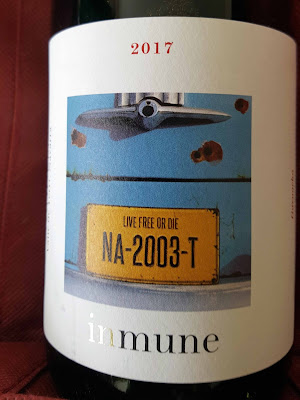Dark ruby colour. Aromas of dark fruit, cherry prominent. Spicy dark fruit on the palate, fresh powerful acidity, medium to full bodied, deep and generous, a harmonious example of the grape right through to the long dry finish. Very Highly Recommended.
I've seen it referred to as a glowing Garnacha. And why not? Le Caveau tells us winegrower Alfred Maestro’s mantra is: “Wine made with only grapes, well-kept vineyards, and healthy land.”
From the beginning (he started making his own wine in 1998), he farmed organically. But, in the cellar, he followed the book, followed the herd, until he began to question himself. No additives in the field so why not follow the same guidelines in the winery? And so he began. On his own path, a path that has led to this beautiful expertly crafted wine and others (he makes no less than 11 cuvées).
By the way, the fruit for this one (a great wine with roast pork) comes from 70 year-old Garnacha vines grown on decomposed granite soils at a staggering 1,150 m. elevation in the upcoming region of Gredos mountain range.
Domaine Bousquet Grande Reserve Malbec (Mendoza, Argentina) 2014, 13.5%, €24.35 Mary Pawle
A violet robe for this organic wine. Strong aromas of ripe red and darker fruits. Fruity and spicy on the palate with rounded tannins. Excellent concentration of pure fruit. Its time in oak (it has been aged in French oak for 12 months) has helped leave it velvety smooth and the finish is long and satisfying. Quite exquisite overall and Very Highly Recommended.
Now what to match with it? The barbecue would be a good place to start. The label suggests grilled red meats, cheeses as well as chocolate based desserts. Some of you may well notice chocolate notes in the wine itself.
A 1990 vacation in Argentina was all it took. For third-generation winemaker Jean Bousquet, it was love at first sight. The object of the Frenchman’s desire: the Gualtallary Valley, a scenic, remote, arid terrain high in the Tupungato district of the Uco Valley in Argentina’s Mendoza region, close to the border with Chile.
Here, where the condors fly and not a vine in sight, Bousquet discovered his dream terroir, an ideal location in which to nurture organically-grown wines. From that virgin territory, nothing planted, no water above ground, no electricity, the French wine-making family’s venture is now recognised as the source of some of Mendoza’s finest wines. The vineyard is located in the foothills of the Andes and is an incredible 1200 metres above sea level. Here the thermal amplitude contributes to fully ripened grapes with excellent acidity.
Here, where the condors fly and not a vine in sight, Bousquet discovered his dream terroir, an ideal location in which to nurture organically-grown wines. From that virgin territory, nothing planted, no water above ground, no electricity, the French wine-making family’s venture is now recognised as the source of some of Mendoza’s finest wines. The vineyard is located in the foothills of the Andes and is an incredible 1200 metres above sea level. Here the thermal amplitude contributes to fully ripened grapes with excellent acidity.































